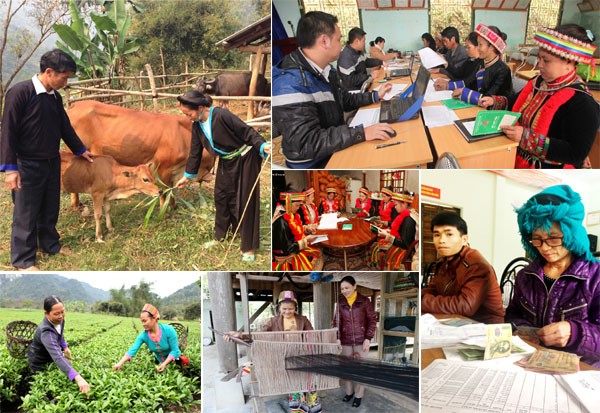(VOVWORLD) - The Vietnamese Party and State consider ethnic affairs and national unity crucial for sustainable national development. Vietnam has implemented policies and invested resources to develop ethnic minority and mountain areas. This commitment was reaffirmed at the ongoing National Assembly session and at recent meetings in Hanoi involving prominent village elders and chiefs.
 Resources are prioritized for development in ethnic minority regions Resources are prioritized for development in ethnic minority regions |
Vietnam has always prioritized resources for socio-economic development in ethnic minority and mountain areas, particularly through a related National Target Program for the 2021-2030 period.
Comprehensive implementation of ethnic policies
In recent years more than 180 policies have been implemented in ethnic minority and mountain areas, helping those regions reduce poverty 2-3% annually. The poverty rate in especially difficult communes and villages has fallen 3-4%, and in poor districts 4-5%, with some localities seeing decreases of over 5%.
Last year, rapid poverty reduction was reported in An Giang, Quang Nam, Quang Tri, and Ha Giang provinces. Other localities like Hanoi, Can Tho, Dong Nai, and Long An have reduced their poverty rate to less than 1%. At the end of 2023, Quang Ninh province reported no households living in poverty.
Vietnam has attained the 4 fundamental goals of the National Target Program for socio-economic development in ethnic minority and mountainous areas in the 2021-2030 period. The National Target Program on sustainable poverty reduction in the 2021-2025 period has provided housing for 13,000 poor and near-poor households.
The Vietnam Bank for Social Policies is implementing 27 preferential credit programs for the poor and other beneficiaries. By the end of October last year, its total outstanding debt increased 9.6% against the previous year.
Socio-economic infrastructure has been strengthened, with numerous successful production and business cooperation models being replicated throughout ethnic minority areas. Investment in educational facilities and healthcare continues, helping to improve medical services, disease prevention, and food safety.
National Assembly deputy Le Thi Thanh Lam of Hau Giang province said: "Local administrations at all levels have mobilized resources for socio-economic development in association with the sustainable poverty reduction program and the new rural development program. These programs have increased public consensus."
Increased investment in specific areas
This year, authorities and sectors will strive to complete training cooperation projects with businesses to provide job opportunities for ethnic minority students, as well as educational reform projects.
At a meeting in Hanoi last Friday with 100 representatives of ethnic communities in border and island areas, President To Lam said: “Ministries, agencies, and localities need to implement Party and State ethnic affairs policies, uphold great national unity, and improve the material and spiritual life of ethnic minorities. We need to effectively implement national target programs and focus on resolving the difficulties and meeting the challenges of socio-economic, infrastructure, health care, and education development. It’s important to ensure social security and pay attention to promoting the cultural identity of ethic people."
In nearly 40 years of national renewal, ethnic minority and border areas have undergone significant changes. Ethnic policies have played, and will continue to play, a vital role in the sustainable development of Vietnam.